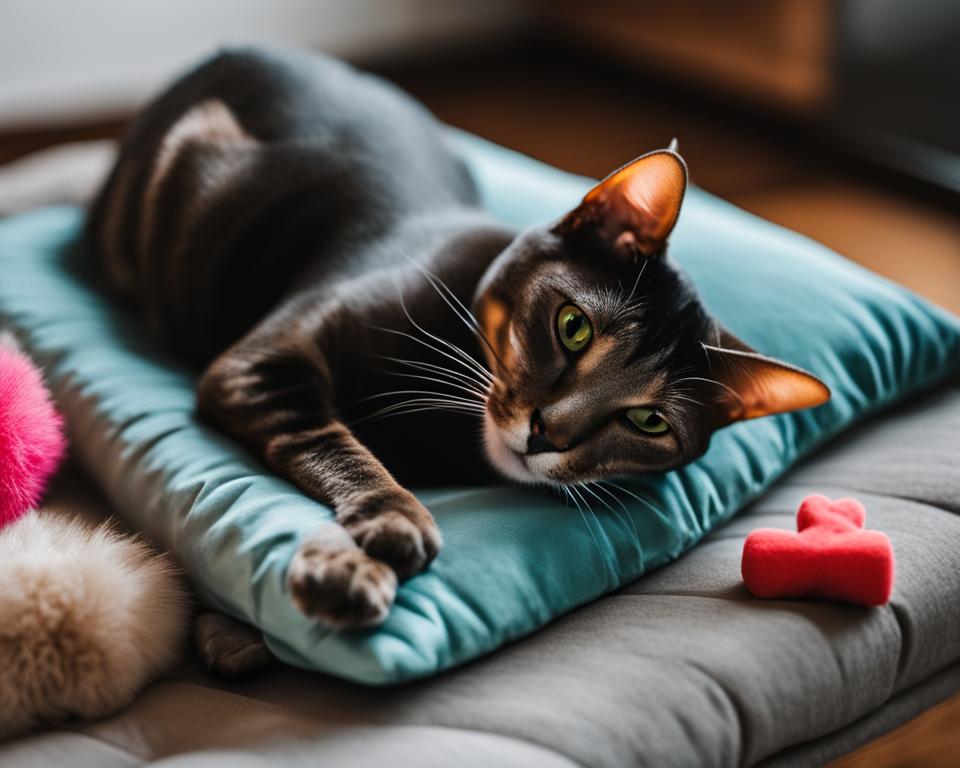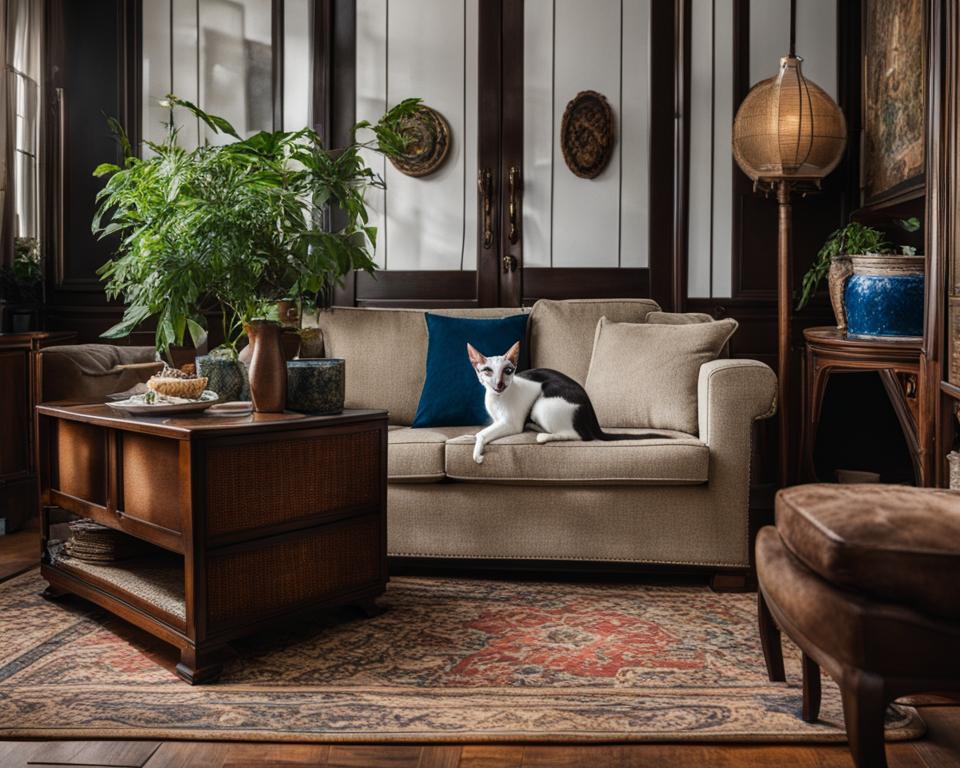Oriental Shorthair cats, like any other breed, can experience behavioral issues that may require attention and resolution. Understanding the underlying causes of these behaviors is crucial in providing effective solutions. Whether it’s handling aggression, foot attacking behavior, or other challenges, addressing your Oriental Shorthair’s behavior is key to ensuring their well-being and harmony in your home.
Key Takeaways:
- Handling Oriental Shorthair Behavioral Issues
- Solving behavioral problems in Oriental Shorthair cats
- Understanding Oriental Shorthair cat behavior
- Oriental Shorthair behavior modification
- Effective Oriental Shorthair cat training solutions
Understanding Foot Attacking Behavior in Oriental Shorthair Cats
Oriental Shorthair cats are known for their energetic and playful nature, but they can also exhibit foot attacking behavior. This behavior may be a result of their natural hunting instincts, boredom, territorial issues, or overstimulation. It’s essential for cat owners to understand the reasons behind foot attacking behavior in order to address and prevent it effectively.
To prevent foot attacks, immediate steps can be taken to redirect the cat’s attention. Providing appropriate toys and interactive play sessions can help redirect their hunting instincts towards more acceptable targets. Verbal commands, such as “no” or “stop,” can be used to discourage the behavior and establish boundaries. It’s also important to protect your feet by wearing closed-toe shoes or using foot coverings when playing with your cat.
Preventing Foot Attacks
Long-term solutions for preventing foot attacks involve addressing the underlying causes and providing appropriate outlets for your cat’s energy. Ensuring your Oriental Shorthair gets enough playtime and mental stimulation can help alleviate boredom and reduce the likelihood of foot attacks. Interactive toys, scratching posts, and climbing structures can provide an enriching environment for your cat. Regular play sessions that mimic hunting behavior, such as using toys that simulate prey, can help satisfy their natural instincts without targeting your feet.
If foot attacking behavior persists or becomes more aggressive, seeking professional help from a veterinarian or cat behaviorist is recommended. They can provide further guidance and techniques tailored to your cat’s specific needs. A professional can also help rule out any underlying medical conditions that may be contributing to the behavior.
| Reasons behind Foot Attacking Behavior | Preventing Foot Attacks |
|---|---|
| Natural hunting instincts | Redirect attention to appropriate toys |
| Boredom | Provide regular playtime and mental stimulation |
| Territorial issues | Establish boundaries and provide enriching environment |
| Overstimulation | Monitor and manage play sessions |
Unique Traits and Health Considerations for Shorthaired Orientals
Shorthaired Orientals have unique traits that make them a beloved choice among cat owners. Known for their energetic nature, these cats are playful and love interactive playtime. They are also highly intelligent and enjoy solving puzzles or playing with challenging toys. Shorthaired Orientals are known for their talkative nature and will often engage in conversation with their human companions.
When it comes to health considerations, there are a few common concerns that owners of Shorthaired Orientals should be aware of. These cats can be genetically predisposed to certain conditions such as hypertrophic cardiomyopathy (a heart condition) and amyloidosis (a condition where abnormal proteins build up in organs). Regular veterinary check-ups are essential to monitor and address any potential health issues.
Weight management is crucial for Shorthaired Orientals to prevent obesity-related health problems. These cats have a tendency to gain weight easily, so it’s important to provide them with a balanced diet and monitor their food intake. Regular exercise is also essential to keep them active and maintain a healthy weight.
| Common Health Concerns | Prevention and Care |
|---|---|
| Dental Disease | Regular dental care, including brushing their teeth and providing dental treats or toys |
| Vaccine-Preventable Infections | Ensure they are up to date on vaccinations and follow the recommended vaccination schedule |
| Parasites | Regularly administer flea and tick prevention medication and ensure their living environment is clean |
| Spaying or Neutering | Consult with your veterinarian to determine the appropriate age for spaying or neutering to prevent certain types of cancers and unwanted litters |
By understanding the unique traits and health considerations of Shorthaired Orientals, owners can provide the optimal care and ensure the overall well-being of their feline companions.
Providing Optimal Care for Your Shorthaired Oriental
When it comes to providing optimal care for your Shorthaired Oriental cat, there are several key factors to consider. From grooming and feeding to exercise and mental stimulation, taking a holistic approach to your cat’s well-being is essential. Additionally, regular veterinary care plays a crucial role in ensuring your Shorthaired Oriental remains healthy and happy.
Grooming Shorthaired Orientals
While Shorthaired Orientals have a sleek and low-maintenance coat, regular grooming is still necessary to keep their fur in optimal condition. Brushing your cat’s coat helps to remove loose hairs and prevent matting. Additionally, it provides an opportunity for bonding and helps to distribute natural oils throughout the fur, promoting a healthy and shiny coat.
Feeding Shorthaired Orientals
Feeding your Shorthaired Oriental a balanced and nutritious diet is crucial for their overall health. Consult with your veterinarian to determine the appropriate type and amount of food for your cat based on their age, weight, and any specific dietary needs. Remember to provide fresh water at all times and avoid overfeeding to prevent obesity-related health issues.
Exercise and Mental Stimulation for Shorthaired Orientals
Shorthaired Orientals are known for their playful and active nature. Engaging in regular play sessions with interactive toys and providing climbing structures or scratching posts can help satisfy their natural instincts and keep them physically and mentally stimulated. Consider rotating toys to keep their interest level high and introduce puzzle toys or treat-dispensing toys to provide additional mental stimulation.
Regular Veterinary Care for Shorthaired Orientals
Regular veterinary care is essential for the health and well-being of your Shorthaired Oriental. Schedule annual check-ups, vaccinations, and preventive treatments for parasites. Your veterinarian will also perform dental exams and recommend appropriate dental care to prevent oral health issues. Spaying or neutering your cat is another important aspect of their overall care, as it helps prevent certain health conditions and unwanted litters.
| Aspect of Care | Recommendations |
|---|---|
| Grooming | Regular brushing to remove loose hairs, prevent matting, and distribute natural oils. |
| Feeding | Provide a balanced and nutritious diet based on your cat’s age, weight, and dietary needs. Avoid overfeeding. |
| Exercise and Mental Stimulation | Engage in regular play sessions with interactive toys, provide climbing structures, and introduce puzzle toys for mental stimulation. |
| Regular Veterinary Care | Schedule annual check-ups, vaccinations, dental exams, and preventive treatments for parasites. Consider spaying or neutering your cat. |
By following these guidelines and providing optimal care for your Shorthaired Oriental, you can ensure that your cat leads a healthy, happy, and fulfilling life.

Preventing Health Issues in Shorthaired Orientals
Ensuring the well-being of your Shorthaired Oriental cat involves taking proactive measures to prevent health issues. Regular veterinarian visits are essential for maintaining their overall health and detecting any potential problems early on. Scheduling routine check-ups allows your vet to monitor your cat’s health, administer necessary vaccinations, and provide preventive care specific to their breed and individual needs.
Early detection of health problems is crucial for Shorthaired Orientals. Regular examinations, including physical assessments and diagnostic tests, can help identify issues such as dental disease, obesity, or genetic predispositions. By catching these problems early, you can initiate appropriate treatments and interventions to prevent further complications.
Maintaining a healthy weight is vital for the well-being of Shorthaired Orientals. Obesity can lead to various health issues, including joint problems, diabetes, and heart disease. To keep your cat at a healthy weight, provide a balanced and portion-controlled diet, encourage regular exercise and play, and seek guidance from your veterinarian on appropriate feeding habits.
Dental care is another important aspect of maintaining your Shorthaired Oriental’s health. Regular brushing of their teeth and routine dental cleanings can prevent periodontal disease, tooth decay, and other oral health problems. Your vet can provide guidance on proper dental care techniques and recommend dental exams and cleanings as necessary.
Preventing Parasite Infestations
Parasite infestations can be detrimental to the health of Shorthaired Orientals. Preventive measures such as regular deworming and flea and tick prevention are crucial. Your veterinarian can recommend the appropriate products and schedules for parasite prevention based on your cat’s lifestyle and risk factors. By staying vigilant and taking preventive actions, you can minimize the risk of parasite-related health issues in your Shorthaired Oriental.

| Preventive Measures | Benefits |
|---|---|
| Regular veterinarian visits | Early detection of health problems |
| Maintaining a healthy weight | Prevention of obesity-related issues |
| Dental care | Prevention of dental disease |
| Preventing parasite infestations | Minimization of parasite-related health issues |
Creating a Safe and Enriching Environment for Your Shorthaired Oriental
When it comes to keeping your Shorthaired Oriental cat happy and healthy, creating a safe and enriching environment is crucial. By providing a cat-friendly home, you can ensure that your feline companion feels secure and content.
One way to create a safe environment for your Shorthaired Oriental is to eliminate potential hazards. Make sure that all toxic plants, chemicals, and small objects that could be swallowed are kept out of reach. Additionally, secure any windows or balconies to prevent accidental falls.
Enrichment is key to keeping your Shorthaired Oriental mentally stimulated. Provide a variety of toys that cater to their natural instincts, such as interactive puzzle toys and scratching posts. Set up different areas in your home for play, rest, and retreat, allowing your cat to explore and have their own space.
To ensure a stress-free environment, minimize exposure to loud noises and create a calm atmosphere. Consider providing hiding spots or vertical spaces, like cat trees or shelves, where your Shorthaired Oriental can escape to if they feel overwhelmed. Establishing a consistent routine and maintaining a peaceful atmosphere can help reduce stress and anxiety.
FAQ
How can I address aggression in my Oriental Shorthair cat?
Understanding the cause of aggression is crucial. This can include territorial issues, fear or anxiety, dominance issues, or underlying medical conditions. Preventing aggression involves socialization, training, environmental enrichment, and maintaining a consistent routine. Managing and redirecting aggression can be done by separating the cat from other animals when necessary, using positive reinforcement techniques, and introducing calming techniques.
Why does my Oriental Shorthair cat attack my feet?
Foot attacking behavior can be a result of natural hunting instincts, boredom, territorial issues, or overstimulation. Immediate steps to stop foot attacks include redirecting the cat’s attention to appropriate toys, using verbal commands, and protecting your feet. Long-term solutions involve providing adequate playtime and stimulation, training the cat to recognize acceptable behavior, and using positive reinforcement techniques. If the behavior persists or becomes more aggressive, seeking professional help from a veterinarian or cat behaviorist may be necessary.
What are some unique traits and health considerations for Shorthaired Orientals?
Shorthaired Orientals are known for being energetic, playful, talkative, and people-oriented. They require proper weight management to prevent obesity-related health issues and regular dental care to prevent dental disease. They are susceptible to vaccine-preventable infections like panleukopenia and calicivirus. Regular preventive measures should be taken to protect them from parasites. Spaying or neutering is important to prevent certain types of cancers and unwanted litters.
How can I provide optimal care for my Shorthaired Oriental?
Providing optimal care for your Shorthaired Oriental includes regular grooming to maintain their short coat, feeding a balanced diet appropriate for their age and health needs, providing regular exercise to keep them physically active, and offering mental stimulation through toys and interactive play. Regular veterinary care, including vaccinations, preventive medication, dental exams, and spaying or neutering, is essential for their overall health and well-being.
What should I do to prevent health issues in my Shorthaired Oriental?
Preventing health issues in your Shorthaired Oriental involves regular visits to the veterinarian for check-ups and preventive care, which can help in early detection and treatment of any health problems. Maintaining a healthy weight through proper nutrition and regular exercise is important to prevent obesity-related issues. Dental care, including regular brushing and professional cleanings, can help prevent dental disease. Preventive measures like vaccination, regular deworming, and flea and tick prevention can help prevent parasite infestations.
How can I create a safe and enriching environment for my Shorthaired Oriental?
Creating a safe and enriching environment for your Shorthaired Oriental involves providing a cat-friendly home with areas for play, rest, and retreat. It is important to ensure a stress-free environment by minimizing exposure to loud noises and stressful situations. Providing environmental enrichment such as toys, scratching posts, and interactive play can keep them mentally stimulated. Creating a safe environment also includes ensuring that the home is free from hazards and providing secure outdoor areas if they are allowed outside.

Leave a Reply